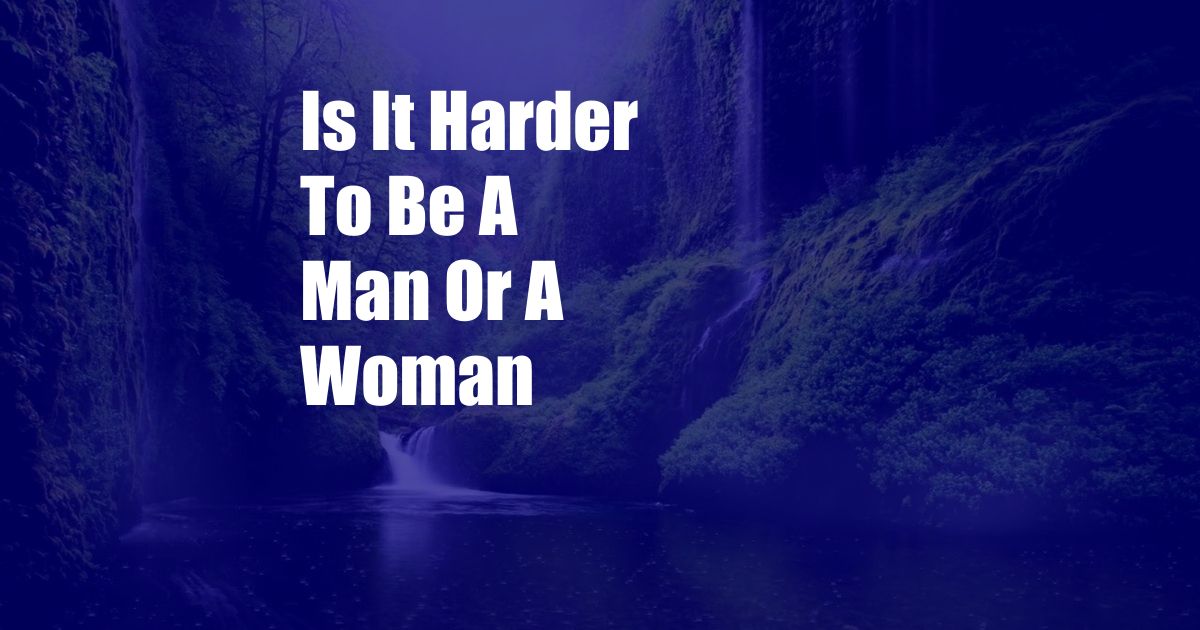
Is it Harder to be a Man or a Woman?
The debate regarding which gender faces greater challenges has been ongoing for centuries, with varying perspectives and complexities. Some may argue that men encounter greater obstacles due to societal expectations and pressures, while others contend that women face unique barriers in education, employment, and personal safety. This article will delve into the complexities of this topic, examining the multifaceted experiences and challenges faced by both men and women.
Historically, gender roles have been clearly defined, assigning specific expectations and responsibilities to each gender. Men have traditionally been associated with strength, leadership, and aggression, while women have been expected to embody qualities such as nurturing, empathy, and domesticity. However, these rigid societal norms have been challenged in recent decades, leading to a re-examination of gender roles and their impact on individuals.
The Pressures of Masculinity
Impact of Traditional Gender Norms
Traditional gender norms have created immense pressure on men to conform to narrow definitions of masculinity. This includes expectations of physical strength, emotional stoicism, and a dominant presence in both the public and private spheres. Men who deviate from these norms may face social stigma, discrimination, and even violence.
The consequence of suppressing emotions can negatively affect men’s mental health. Studies have shown that men are less likely to seek help for mental health issues, leading to higher rates of suicide and substance abuse among male populations.
In the workplace, men may feel pressured to engage in risky behaviors or sacrifice their well-being in pursuit of career advancement. This can lead to increased stress, physical ailments, and a lack of work-life balance.
The Challenges Faced by Women
Education and Career Advancement
Women have historically faced significant barriers in education and employment. Despite progress in recent decades, gender disparities persist in many fields, particularly in STEM (science, technology, engineering, and mathematics). Women are less likely to pursue higher degrees in these areas and may encounter bias and discrimination in the workplace.
Furthermore, women often face challenges in achieving leadership positions and are underrepresented in senior management roles. The “glass ceiling,” an invisible barrier that prevents women from advancing to the highest ranks, is still a reality in many organizations.
Personal Safety and Violence
Personal safety is a major concern for women worldwide. Women are more likely to be victims of sexual harassment, sexual assault, and intimate partner violence. These experiences can have profound and lasting impacts on their physical, mental, and emotional well-being.
Tips and Expert Advice
Navigating the challenges faced by both men and women requires a multifaceted approach. Here are some tips and expert advice:
- Challenge Gender Stereotypes: Re-evaluate and challenge traditional gender norms that limit individuals’ choices and aspirations.
- Promote Gender Equality in Education and Employment: Encourage equal opportunities for education and career advancement, regardless of gender.
- Encourage Men to Seek Help: Create a supportive environment where men feel comfortable seeking help for mental health issues.
- Promote Respect and Consent: Educate both men and women about the importance of respect, consent, and healthy relationships.
- Support Victims of Violence: Provide resources and support for victims of sexual harassment, assault, and intimate partner violence.
By implementing these strategies, we can create a more equitable society where both men and women have the opportunity to reach their full potential and live fulfilling lives.
Frequently Asked Questions
Q: Is it true that men have it easier than women?
A: The challenges faced by men and women are multifaceted and differ across cultures and circumstances. While men may face societal pressures, women encounter unique barriers in education, employment, and personal safety.
Q: What are some of the most significant challenges faced by men today?
A: Men may experience pressure to conform to traditional gender norms, which can stifle their emotional expression and well-being. They may also encounter discrimination in the workplace and face higher rates of suicide and substance abuse.
Q: How can we promote gender equality?
A: Promoting gender equality requires a comprehensive approach, including challenging gender stereotypes, ensuring equal opportunities in education and employment, supporting men who seek help, and creating a culture of respect and consent.
Conclusion
The question of whether it is harder to be a man or a woman is complex, with varying perspectives and challenges. Both genders face unique obstacles and societal pressures that impact their lives. By recognizing the challenges faced by each gender, promoting gender equality, and challenging harmful stereotypes, we can create a more just and equitable society where everyone has the opportunity to thrive.
Are you interested in learning more about the challenges faced by men and women? Share your thoughts and experiences in the comments below.